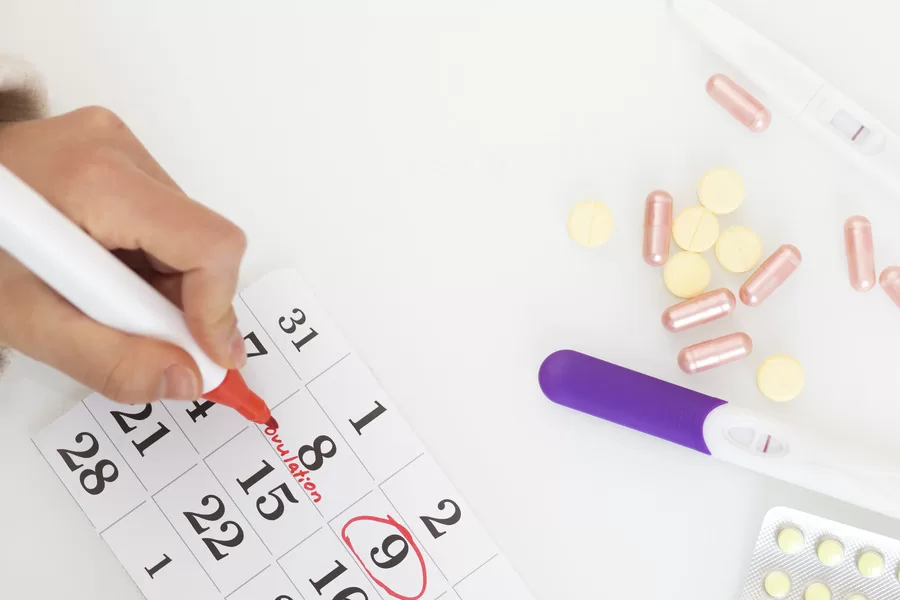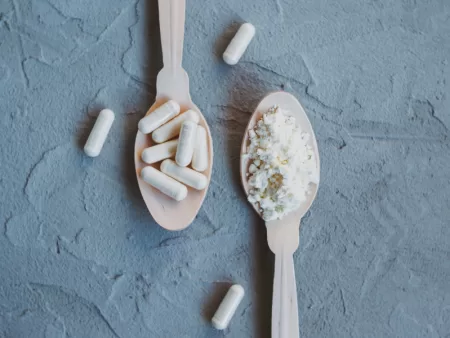
Have you ever considered why a hormone like testosterone, usually associated with men, is important for women, especially during their menstrual cycles? This often overlooked detail sheds light on a fascinating aspect of women’s health.
If you’re intrigued by how your body works or looking for answers to why your menstrual cycle behaves the way it does, understanding testosterone’s impact might provide some unexpected yet valuable insights.
Testosterone in Women: Not Just for Men
Did you know that girls, like boys, have the hormone testosterone? This is true! Although we often think of it as a boy hormone, girls have it too, and it does some very important things for them.
First, testosterone helps girls keep their muscles strong and their bones strong. From childhood on, it also helps her have the energy to play and have fun. And it plays a role in how she feels every day, such as whether she’s in a good mood to play or feeling a little grumpy.
Along with growing up, every month a woman’s body undergoes changes, which we call the menstrual cycle. Testosterone goes on a bit of a rollercoaster ride during this time. It goes up and down. Every month just before a woman can become pregnant, testosterone levels reach their maximum. This helps her body prepare in case a baby is conceived. At the same time, some women feel very energetic and happy.
Having the right amount of testosterone is like having the perfect amount of sugar in lemonade—not too much and not too little. If a woman has too much testosterone, this can complicate matters. Her periods may become irregular, making it more difficult for her to conceive when she is ready. If she doesn’t have enough of this hormone, she may be very tired, not want to do fun things, and may even feel sad.
So, testosterone is especially important for women, not just men. It helps the female body in many matters: from the regularity of menstruation to the feeling of happiness and fullness of energy. It is very important to understand how special this hormone is for everyone.
The Menstrual Cycle
- The Beginning (Menstruation): This is when a woman’s period starts. It’s like the opening scene of our story, where the body is getting ready for what’s next. Hormones are slowly getting into action, setting the stage for the cycle.
- The Preparation (Follicular Phase): The body is now preparing an egg that may one day become a child. Hormones such as estrogen signal that it is “time to get ready.” Testosterone also begins to rise, giving the body a little more energy and strength.
- The Main Event (Ovulation): This is when the egg is fully ready and leaves its nest (the ovary). Testosterone is at its peak, playing its part in making the body extra ready for the possibility of pregnancy.
- The Wait (Luteal Phase): During this final stage, the body is in a waiting mode to see if conception will occur. Otherwise, hormone levels, including testosterone, begin to fall, signaling that the story is coming to an end and a new cycle will soon begin.
What Testosterone Does in a Woman’s Body During Ovulation
Let’s talk about the testosterone hormone in women. It’s like a secret assistant that does a lot of cool things, especially when it’s time to ovulate. Ovulation is the process when a woman’s body prepares an egg that may one day become a child.
The Ovule Big Moment: Ovulation
Each month, there’s a special time when a woman’s body gets an egg all set for a big journey. This is ovulation. When this happens, testosterone levels in her body go up.
More Than Just Helping your Ovule
But testosterone has more jobs. It also helps make the inside of the uterus (where the baby grows) truly welcoming. Thus, if an ovule meets a sperm and they begin to create a child, the womb will become a cozy home for him. If there is not enough testosterone, the uterus may not be ready and this can make it difficult to conceive a baby.
A Happy Boost
Around ovulation, when there’s more testosterone, women often feel great. They might have more get-up-and-go, feel happier, and enjoy being around people more. It’s like testosterone is giving them a bit of extra sunshine in their day.
Testosterone: The Team Player
Testosterone doesn’t work alone. It’s part of a team with other hormones, like estrogen and progesterone. These hormones all need to work together nicely to keep things like the menstrual cycle going smooth. When they do, it helps women have regular periods and stay healthy.
When Testosterone Levels Don’t Play Nice: Its Impact on Periods
When testosterone levels and hormone levels in general are not quite right, it can disrupt a woman’s menstrual cycle.
When There’s a Bit Too Much Testosterone
Imagine if your body suddenly started doing things it’s not supposed to, like growing extra hair where it normally doesn’t. This can happen when a woman has more testosterone than she needs. It can also lead to something called Polycystic Ovary Syndrome, or PCOS for short. This means tiny cysts start growing on the ovaries, and it can mess up the menstrual cycle, making periods unpredictable. It might also make it tougher to have a baby when the time comes.
The Flip Side: Too Little Testosterone
Now, what about when there’s not enough testosterone? Well, it’s like when your phone battery is low, and everything slows down. Women might feel super tired, less interested in activities they usually enjoy, and might not feel like being romantic. Their muscles and bones might also feel weaker.
Keeping an eye on testosterone levels is pretty important for menstrual health. If you’re worried your levels might be off, it’s a good idea to chat with a doctor. They can help figure out what’s going on and suggest ways to balance things out.
Testosterone’s Magic in Girls and Women
Feeling of Falling in Love
Testosterone is like a little love superhero. This helps women feel more love and desire for hugs. When testosterone levels decrease, a woman may no longer want to cuddle as much. But remember, the feeling of falling in love depends not only on the level of hormones – feelings and life situations also matter.
Energy and Mighty Muscles
This superhero hormone also gives women energy. It makes their muscles strong, like they can lift a big teddy bear with ease.
Keeping the Body Super Strong
Testosterone does even more amazing things! It keeps bones strong and helps women feel happy and think clearly. It also helps keep their body fit and ready for any adventure.
It is important to have the right amount of testosterone. If there is too much or too little, it can cause some problems. Doctors can help make sure it is in perfect condition.
Keeping Testosterone Levels Just Right
Let’s talk about easy and clear ways to keep testosterone levels balanced, with both medical help and everyday habits.
Doctor’s Help
- Special Medicines: Sometimes, doctors give special medicines to help balance testosterone. This could be through skin patches, gels, shots, or tiny pellets placed under the skin.
- Prescription Drugs: For those with too much testosterone, there are medicines that can lower it down to a comfy level.
Everyday Tips
- Eating Right: Foods that are good for you, like fruits, veggies, lean meats, and grains, can help keep your hormone levels happy.
- Staying Active: Exercise, like running or lifting weights, is great for balancing hormones.
- Relaxing: Stress can mess with your hormones. Doing things that help you chill, like yoga or deep breathing, can make a big difference.
- Good Sleep: Getting enough sleep helps a lot. Try to sleep at the same time every night and make your room comfy for sleeping.
Remember, always talk to your doctor for the best advice for you. Everyone’s different, so what works for one person might not work for another.
Testosterone Balance: Unique Tips and Tricks
Let’s explore some not-so-typical ways to keep your testosterone levels in a happy zone, both medically and in your day-to-day life.
Doctor’s Corner: Not Your Usual Advice
Doctors have some neat tricks up their sleeves for balancing testosterone. Here’s what they might do differently:
- Customized Hormone Plans: Instead of one-size-fits-all, doctors can create a hormone plan that’s tailored just for you, using unique combinations of treatments.
- Creative Medications: There are more options than just pills. Think gels, skin patches, or even tiny under-the-skin implants that do the hormone balancing act.
- Check-ups with a Twist: Regular visits may include advanced technology to monitor hormone levels, making adjustments very precise.
Daily Life Hacks for Hormone Health
Away from the doctor’s office, there are some quirky and effective ways to keep those hormone levels just right. Check these out:
- Eating: Try adding some unusual but healthy foods to your diet. Ever tried quinoa or chia seeds? They’re not just trendy; they’re great for hormones.
- Fun-Filled Exercise: Ditch the boring gym routine. How about dance classes, rock climbing, or even hula hooping to get those hormones dancing?
- Chill-Out Adventures: For stress, think beyond yoga. How about laughter therapy, art classes, or even joining a book club?
- Sleep Quests: Make your bedtime routine an adventure. Try different relaxing scents or a playlist of nature sounds.
Remember, chatting with your healthcare buddy is always a good idea to make sure these unique tips are right for you!
Conclusion
Exploring the realm of women’s health unveils the hidden functions of testosterone. Testosterone has a substantial influence on several aspects of women’s well-being, including their physical health, mood, energy levels, and management of the menstrual cycle. Optimal amounts of testosterone are essential; an excess or deficiency may result in physiological and psychological health problems, such as menstruation abnormalities and mood fluctuations. Testosterone levels and overall hormonal balance may be influenced by factors such as diet, physical activity, stress control, and sleep quality. Specialized hormone therapy and lifestyle adjustments are offered as medical interventions to restore hormonal balance in cases where it is deemed required. Comprehending and controlling testosterone levels is a component of a comprehensive approach to women’s health, which focuses on both medical interventions and lifestyle choices to achieve optimum physical and mental state.
FAQs
No, testosterone plays a crucial role in women’s health too, affecting physical strength, bone density, mood, and menstrual cycle regularity.
Yes, women can have high levels of testosterone, leading to conditions such as Polycystic Ovary Syndrome (PCOS), irregular menstrual cycles, and other health issues.
Symptoms of low testosterone in women may include fatigue, decreased muscle and bone mass, mood changes, and a reduced sex drive.
Natural management includes a balanced diet, regular exercise, stress reduction techniques, and maintaining a healthy sleep schedule.
While no food directly adjusts testosterone levels significantly, a balanced diet rich in whole foods like fruits, vegetables, whole grains, and lean proteins can support overall hormonal balance.






